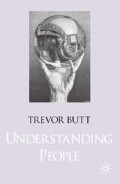Abstract
In order to understand people, it has traditionally been assumed by psychologists that we have to look ‘inside’ them to find out what it is that is going on in their minds that causes their behaviour. The study of personality has been that part of psychology devoted to this pursuit. Of course, modern psychology does not talk about minds, but cognitive structures, construct systems and unconscious forces. But there remains an inside-outside distinction that is predicated on the assumption of the person as a psychological individual: one who is ultimately responsible for his actions. Nevertheless, it has always been recognised that situational context is important in producing behaviour, a point underlined by Mischel’s (1968) work. As we have seen, those personality theories that have dealt with this do so by concentrating on how individuals construe and interpret their situations. They search for personal constructs or cognitive schema that account for personal meanings. This produces an interface with social psychology. Aronson et al. (2002:12) see social psychology as located between ‘its two closest intellectual cousins, sociology and personality psychology’. Modern social science maintains the distinction between the individual and society.
Preview
Unable to display preview. Download preview PDF.
Copyright information
© 2004 Trevor Butt
About this chapter
Cite this chapter
Butt, T. (2004). The Social Constructionist Critique of Personality. In: Understanding People. Palgrave, London. https://doi.org/10.1007/978-0-230-00059-9_4
Download citation
DOI: https://doi.org/10.1007/978-0-230-00059-9_4
Publisher Name: Palgrave, London
Print ISBN: 978-1-4039-0466-9
Online ISBN: 978-0-230-00059-9
eBook Packages: Palgrave Social & Cultural Studies CollectionSocial Sciences (R0)

